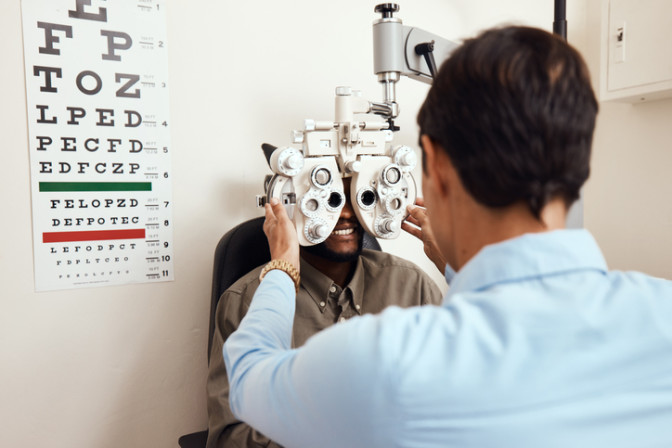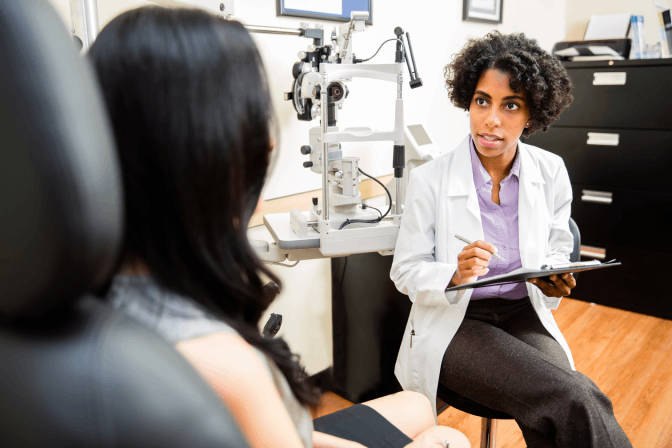Buy One, Get One 50% OFF Eyeglasses
* Restrictions apply. Ask a Team Member for details.

Regular vs. Diabetic Eye Exams: Which Do You Need?
Eye exams play a crucial role in maintaining visual health, serving as preventive measures to catch potential eye issues before they become problematic. However, for individuals managing diabetes, the stakes are even higher, necessitating a different approach to eye care.
Diabetic patients require specialized eye exams due to the unique risks their condition poses to their eye health. At The EyeDoctors Optometrists, we're dedicated to providing comprehensive care tailored to each individual's needs. This article aims to demystify the differences between regular and diabetic eye exams, offering insight into why each is essential and what patients can expect from their visit to our practice.

A Closer Look at Standard Eye Exams
Standard eye exams are foundational to eye care, ensuring that your vision is as clear as possible and your eyes are healthy. These exams typically start with a vision check using a Snellen Eye Chart to assess clarity at various distances. You may recognize this as the iconic chart with letters of different sizes on it.
Your prescription is determined afterwards, utilizing a phoropter to find the lens strength that brings your vision into sharp focus. Phoropters are the giant metal “goggles” doctors place in front of your face to simulate glasses. As doctors shift between lenses of different powers of correction, they ask you which improves vision more, narrowing down your prescription until it’s an exact match for each eye.
For those undergoing a comprehensive examination, we include pupil dilation. This step, despite causing temporary blurriness, is invaluable for a thorough inspection of the eye’s internal health, allowing us to identify conditions like glaucoma early on. Our use of advanced diagnostic tools, such as the ophthalmoscope for internal viewing and the slit lamp for surface examination, ensures a holistic assessment of your eye health.
The Aim of Regular Eye Exams
The primary objective of regular eye exams is to figure out what sort of new glasses or contacts you need, but at The EyeDoctors Optometrists, they extend beyond merely updating your prescription. We’re committed to a comprehensive evaluation of your eye health, employing detailed assessments to detect and manage any conditions, thereby safeguarding your vision for the long term.

Diving into Diabetic Eye Exams
Diabetic eye exams incorporate all the elements of a comprehensive eye exam but are specifically designed to address the unique challenges faced by individuals with diabetes. In particular, they focus on the back of the eye and the retina, where diabetic eye conditions usually form. Here's what you can expect from a diabetic eye exam.
Gathering Your Health History
This is the first step to a diabetic eye exam and one of the most crucial ones. A thorough discussion of your diabetes and family health history enables us to personalize your exam, focusing particularly on diabetes-related risks. It also gives us insight into any treatment you’ve received before so we can assess your progress and adjust your treatment if necessary. You’ll be asked to fill out detailed paperwork prior to your exam that will form some of the basis of the discussion with your doctor.
Detailed Examination Through Pupil Dilation
Pupil dilation is a common practice in both exam types, essential for a clear examination of the retina and the identification of any signs of diabetic eye conditions. The difference between how this is used in regular eye exams versus diabetic eye exams is the focus on the retina and the back of the eye. Regular eye exams involve searching for signs of numerous common eye conditions, while diabetic eye exams focus on looking for the onset of diabetic retinopathy, macular degeneration, and other retinal conditions.
Advanced Retinal Scans with OCT
Optical Coherence Tomography (OCT) offers an in-depth view of the retina, which is crucial for the early detection of changes or damage related to diabetes. You can think of it as a CT scan for your eyes. It allows your doctor to view your retina in cross-sections and discover any blood vessels that may be causing issues beneath the surface.
Retinal Photos
Utilizing a special camera, we capture detailed photographs of your retina to monitor for early signs of diabetic eye diseases and track their progression. This usually takes place before you enter the exam room. You’ll be asked to place your eye against the camera, which will quickly take a photo of your inner eye. This is done for both eyes. The way the image is captured does require the use of a brief but powerful flash. You may experience an afterimage and slight disorientation after the photo is taken, but this should resolve quickly.
Preventive Glaucoma Screening
Glaucoma is a serious condition that can quickly rob a patient of their sight if not caught and treated early enough. Given the increased risk of glaucoma associated with diabetes, we include an eye pressure test as a crucial preventive measure.
Assessment of Vision Changes
Just like with regular exams, we’ll ask you to read a Snellen Eye Chart during a diabetic eye exam. A standard vision acuity test is conducted with an additional focus on detecting any changes that may have occurred due to diabetes, ensuring comprehensive monitoring of your visual health. Sudden drops in vision can indicate underlying problems.
The Importance of Diabetic Eye Exams
Specialized diabetic eye exams at The EyeDoctors Optometrists are designed to identify and manage conditions specifically associated with diabetes, with a particular focus on the retina. Regular screenings are vital for early detection and treatment, helping to prevent severe vision impairment or loss. Maintaining regular appointments for diabetic eye exams is key to effective diabetes management and safeguarding your vision against the silent progression of eye conditions related to diabetes.
Your Diabetic Vision Care Partners at The EyeDoctors Optometrists
Choosing The EyeDoctors Optometrists for your eye care needs means selecting a team that’s fully equipped to address the unique challenges of diabetic eye health, alongside providing routine care. With 22 locations throughout Kansas, we’re committed to offering the latest in diagnostic and treatment technologies, ensuring personalized, top-quality care for every patient.
Contact us today to schedule your next eye exam and join us in our commitment to maintaining clear and healthy vision.